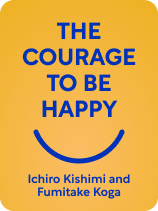

This article is an excerpt from the Shortform book guide to "The Courage to Be Happy" by Ichiro Kishimi and Fumitake Koga. Shortform has the world's best summaries and analyses of books you should be reading.
Like this article? Sign up for a free trial here.
How free do you feel? Is your past holding you back from becoming the person you want to be?
Adlerian psychology offers insights into our innate desire for independence and freedom. It provides strategies to focus on what we can control and reframe our past experiences. These ideas can help us overcome obstacles and achieve personal growth.
Keep reading to discover how you can take charge of your life and cultivate true independence.
Desire for Independence
The first goal of Adlerian psychology is independence. Kishimi and Koga say that everyone has an innate drive to overcome their natural helplessness through self-improvement. This desire for independence is evident from a very early age. For example, children often insist on doing things for themselves as soon as possible.
The authors also say that the desire for independence is actually a desire for freedom. What people really want is the ability to choose their own course of action and carry it out without needing anyone else’s help or approval.
(Shortform note: Though it’s counterintuitive, the authors’ definition of freedom has an inherent aspect of self-control. This kind of freedom doesn’t mean just doing whatever you want at any given moment; it means that you have the skills and discipline to achieve the goals you choose for yourself. This is also the main thesis of the book Discipline Equals Freedom, by former Navy SEAL Jocko Willink. Willink writes that discipline is the only way to free yourself from bad habits and negative thought patterns, achieve your full potential, and—by doing so—find happiness.)
We’ll look at two crucial strategies for developing your own sense of independence and freedom. First, we’ll discuss the importance of focusing your efforts on things that you can control and not letting others take that control away from you. Second, we’ll explain Adler’s theory that you can become the person you want to be at any time: By changing how you think about your past, you can change who you are in the present. Finally, we’ll examine some common obstacles that prevent people from becoming truly independent.
Focus on Your Own Tasks
One fundamental concept of Adlerian psychology that Kishimi and Koga discuss is separation of tasks. According to this idea, every person has their own tasks to devote their attention and energy to. It’s not our place to interfere with anyone else’s tasks; likewise, we shouldn’t let other people interfere with ours.
The authors say that, to determine whether a task belongs to you, you should ask yourself two questions:
- Is the outcome of this task in your control?
- Are you directly affected by the outcome of this task?
If the answer to both questions is yes, that’s a task you can claim. If not, then it belongs to someone else.
For instance, choosing where you live as an adult is your task. You’re the one who has to build a life wherever you choose to be, and you must accept the benefits and drawbacks of living in that place. However, the people around you may try to influence you as you make that decision. Maybe your parents don’t want you to move somewhere too far away, or your friends tell you the city you’re moving to is too expensive. Listen to your loved ones and consider what they say, but remember that where you’ll live is ultimately your decision—don’t let others interfere with your task of making that choice.
On the other hand, dealing with their feelings about you moving away is your loved ones’ task, not yours. This is because you can’t control how other people feel, and their feelings only affect them; the answer to both of the previous questions is “no,” and therefore this is not something you can take responsibility for.
(Shortform note: Focusing your energy on your own tasks as the authors suggest is often an effective way to let go of things you can’t control, but you may find that you’re still worrying about things such as the rising cost of living or the chance of a loved one getting injured. Fortunately, anything that reduces stress will help you to break out of those frightening thought patterns. To give a few examples: regular exercise, a healthy diet, and good sleep habits are all known to reduce stress and boost overall well-being, and therefore they’ll help you to face what you can’t control with calmness and acceptance.)
| Strategies to Reduce Approval-Seeking Kishimi and Koga discuss the importance of focusing on your own tasks and not letting other people interfere with them. However, this can be difficult for people-pleasers, or people who constantly seek the approval of others. Here are a few strategies that can help you to overcome people-pleasing behavior and reduce your reliance on outside approval: 1. Reflect on Your Past Experiences: Take some time to reflect on instances of invalidation you may have experienced throughout your life, particularly during childhood. Ask yourself if you felt invisible or deprived of healthy attention and praise growing up, and consider ways you can give yourself the nurturing and validation you may have lacked. If you need additional support, consider reaching out to a mental health professional who can guide you through this process. 2. Practice Self-Care and Self-Validation: Replace excessive validation-seeking behaviors with self-soothing methods such as mindfulness meditation and yoga. Research has shown that a regular mindfulness practice can physically change the brain, enhancing decision-making, empathy, and emotional regulation. Incorporate positive affirmations tailored to your specific needs, such as “I am confident” or “I am enough” to replace negative self-talk with empowering thoughts. 3. Assert Your Boundaries: Learning to say no can be challenging, especially if you have a fear of abandonment. Practice saying no to smaller requests before gradually moving on to larger ones. This will help you build resilience and become more comfortable with the discomfort of potentially disappointing others. 4. Cultivate Supportive Relationships: Evaluate your social networks and determine whether they’re emotionally nourishing or depleting. Seek out communities or professionals who can provide you with the emotional validation you need, such as support groups or therapists specializing in boundary work. 5. Distance Yourself From People Who Invalidate You: When you find yourself seeking validation, assess whether the person you’re turning to is emotionally safe and supportive, or if they have a history of violating your personal boundaries. If the latter is true, consider reaching out to a more supportive friend, talking with a therapist, or taking time for self-care instead. Remember, it’s crucial to prioritize your emotional well-being and avoid seeking validation from those who may cause you further distress. |
Free Yourself From Your Past
Next, Kishimi and Koga discuss the Adlerian idea that the events of your past don’t have the power to define who you become. Instead, it’s how you think about past events that influences who you are today. Therefore, you can decide who you want to be at any point in your life by changing how you frame your view of the past.
Many people justify the current version of themselves by holding on to a negative view of their past. They believe that they are the way they are because of unfortunate things that happened to them, and they use those events as an excuse not to improve. However, your past only exists to the extent that you give meaning to it, and it doesn’t need to influence how you live your life now.
(Shortform note: Our understanding of the brain’s response to trauma has significantly advanced since Adler’s time. Modern neuroscience has revealed that trauma can fundamentally change brain structure and function, particularly in areas related to threat detection, emotional processing, and memory. This means that, for many people, overcoming the past isn’t as simple as just “letting go” or deciding to change how they think about it. For example, some studies have shown that the brain’s salience network—which is crucial for learning and threat detection—undergoes changes that make it challenging for trauma survivors to distinguish between danger and safety. As a result, they may feel as if they’re always in danger.)
Obstacles to Independence
In addition to discussing ways to develop your sense of independence, Kishimi and Koga discuss some common obstacles that may stop you from doing so.
The first barrier to independence is a lack of courage. This often stems from the fear of making bad decisions or failing in your endeavors, which can prevent you from taking charge of your own life. To overcome this barrier, face up to your fears and start taking responsibility for your situation and your actions. As you start this process, the authors urge you to remember that mistakes are a natural part of the learning process, and failure is an opportunity for growth and improvement; view these as opportunities you can embrace, rather than as shameful outcomes to avoid at all costs.
| How to Be More Courageous Kishimi and Koga say that it’s important to overcome your fears and develop the courage to be happy, but they don’t offer much actionable advice about how to do that. In The 4-Hour Workweek, entrepreneur Tim Ferriss suggests overcoming the fears that are holding you back by asking yourself clear, specific questions about those fears. For instance, what’s the worst-case scenario that might result from a certain action? If that worst-case scenario happens, how will you handle it? What are you missing out on by not taking that action? Ferriss says that by asking and answering questions like these, you’ll realize that your fear is harming you more than any likely outcome of whatever action you’re considering. |
Another obstacle to independence is a lack of will. Kishimi and Koga write that many people find it easier to let others make decisions for them and simply do as they’re told. However, this approach hinders their personal growth and the development of critical decision-making skills.
To overcome this obstacle, the authors suggest gradually taking on more responsibility and practicing making decisions for yourself, even if they’re small ones at first; for instance, you don’t need to embark on a new career path right away, but you might start by taking the initiative at your current job and making a decision that you’d normally clear with a supervisor first.
(Shortform note: The kind of passivity the authors describe here is often a result of past trauma. In Complex PTSD, psychotherapist Pete Walker explains that people who repeatedly experience trauma, especially in childhood, often get “trapped” in their trauma responses and go through life as if they’re in constant danger. Someone who never tries to assert themselves or make their own decisions may be stuck in a freeze response: Like an animal who hides from danger by staying perfectly still, they try to remain unnoticed by keeping quiet and staying out of the way.)
Finally, Kishimi and Koga say that self-centeredness is another significant barrier to self-reliance. This is a barrier that we all start building in infancy; babies are self-centered out of necessity, since crying for help is their only tool for survival. However, some people never emotionally grow beyond this self-centeredness, even after physically maturing and becoming capable of taking care of themselves. As a result, they continue to expect others to cater to their needs and desires throughout their lives—the exact opposite of independence. You can overcome self-centeredness by developing a strong sense of community.
(Shortform note: The authors say that it’s important to overcome self-centeredness and become more independent, but (aside from claiming that doing so will make you happier) they don’t explain why you’d want to give up an easy life of letting others do things for you. A growing body of research suggests that selflessness—helping others instead of always letting them help you—can boost your physical and emotional well-being, reduce stress, and may even help you to live longer. While the reasons for this aren’t explored in these studies, it’s most likely because humans evolved to live in tribes; as a result, we’re naturally driven to help each other, and doing so makes us feel good.)
Exercise: Consider Your Independence
Now that you’re familiar with some of Kishimi and Koga’s interpretations of Adlerian psychology, think about how you could apply those principles to your life. This includes how you approach your relationships with the children in your care, if there are any.
- How independent do you feel at this point in your life? Are you more-or-less free to do what you want, or are you subject to someone else’s authority (such as your parents, your boss, or a parole officer)?
- What’s one thing you could do to become more independent? For example, perhaps a new role at work would give you more autonomy, or you could take on more tasks around the house so that you can decide how you’d like those tasks to be done.
- If there are any children in your care, what’s one way you could show them respect (as Adler defined it) and bolster their independence? For example, instead of constantly fighting with a child to get them to do their homework, you could respect their decision and let them face the consequences of it: bad grades and uncomfortable conversations with their teacher.

———End of Preview———
Like what you just read? Read the rest of the world's best book summary and analysis of Ichiro Kishimi and Fumitake Koga's "The Courage to Be Happy" at Shortform.
Here's what you'll find in our full The Courage to Be Happy summary:
- What the earliest days of psychology can teach you about being happy
- How to raise children to be independent with a strong sense of community
- How to apply Adlerian psychology to your own life






